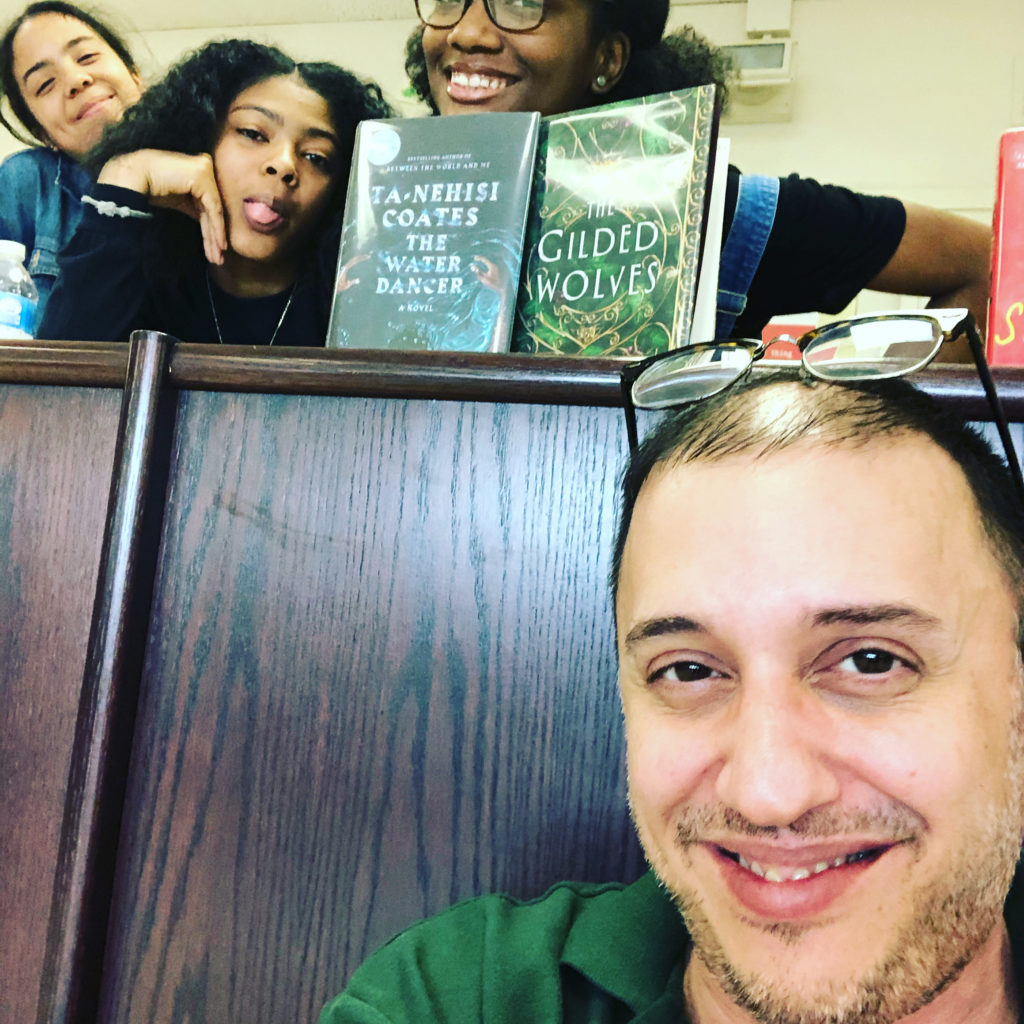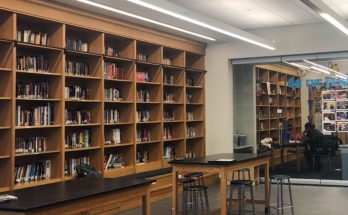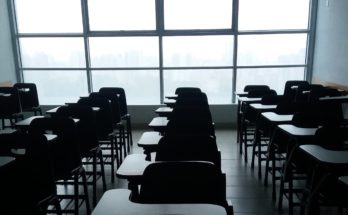
When Mayor Bill De Blasio announced in mid-March of this year that New York City schools would switch to remote learning, high school librarian Ciro Scardina went to work. He sat at a small table in his Staten Island kitchen and recorded a video for Instagram.
“Hey, ladies and gentleman. It’s me, Mr. Scardina,” he said. “It’s strange talking to you in this mode. But, here we are.”
Scardina promised the 4,000 students at Brooklyn’s Edward R. Murrow High School regular video updates. “I wanted to let you know that a favorite part of my job is actually you,” Scardina said pointing his fingers at the camera. “Whomever is looking at this, you’re my favorite part of the job.”
When the COVID-19 pandemic hit New York City, teachers were given just a few days to transition online. This was a major undertaking at Murrow High School, one of the city’s largest schools with over 300 staff and over $30 million, according to city data.
That’s where Scardina stepped in. Like his fellow school librarians scattered across New York City schools, he had several advantages. He already held a special one-on-one role with his students before the shut down. And, he was already adept at virtual learning and ready to support teachers and administrators.
With the bookshelves in the large Murrow library off-limits for the time being, Scardina built an online database for students to easily find and read e-books. He invited students to an after-school virtual library session, and since reading might feel hard during a crisis, he’s starting a podcast club.
But mostly, Scardina reaches the students through Instagram. He had set up the @MurrowLibrary account in February. At first, it was a home for book recommendations and photos of students in the library.
But then, the pandemic hit.
His first video addressing the camera had more than 2,500 views and over a hundred comments.
“You are the best librarian out there,” one student wrote.
“We love you ciro,” said another.
“No one can replace the best librarian in the world. Zero is the best person in the whole damn world,” commented a student.
School librarians are an authority figure to students, but they don’t give kids grades. So they often play a mix between a teacher, a mentor, and a friend. Scardina lets students call him by his first name, Ciro, which they often mispronounce as “Zero.”
On Instagram, Scardina posts videos reading poetry aloud – most recently he adapted a coronavirus version of “Sick” by Shel Silverstein. He takes the students on tours of his Staten Island neighborhood, and shows a sign on his kitchen fridge that reads, “remain calm, call a librarian.”
And he keeps an open line for faculty to call or text if they need any help. He made a digital learning guide that was shared with the entire school and built a catalogue to help optimize security during video conferencing. When journalism and literature teacher Scott Menscher needed digital copies of books for his students, Scardina made it happen.
“I call Ciro my hero,” said Menscher. “Because he is. Especially now, he’s such a vital part of keeping the teachers and the students connected to what is going on.”
When students comment on his Instagram posts, Scardina asks how they’re doing. When they message him, he messages back. “I think it’s important for kids to see the human side of their teachers,” he said. “I was not exactly your typical, what you would imagine a librarian to be.”
High school wasn’t easy for Scardina. He grew up in Staten Island with an addict father and was bullied terribly during middle school and high school. Scardina had trouble following directions and was insecure about his sexuality. So he sought attention through troublemaking. “I was like a clown that wanted to do anything and everything to make friends because I had none,” he said.
Petrified of the bullying, he spent his senior year of high school hiding in the library. Every single lunch period he sat alone, reading. It wasn’t until after he graduated, when he was in college studying fashion, did Scardina finally accept that he was gay. He spent the summer of his junior year in London, and when he arrived it was gay pride weekend. Scardina remembers getting out of a tube station and thinking to himself, “I don’t have to be gay and just relegate myself to a life of terribleness. I can be happy.”
After several years in the fashion industry, Scardina left to pursue teaching and became an elementary teacher in 2002. After several years he enrolled in a library sciences program through Syracuse University and became a library media specialist in 2011. He worked as an elementary school librarian until he was hired at Murrow two years ago. He’s now one of the school’s two librarians, with a third out on family leave.
Rachel Green, a school librarian at nearby Westinghouse High School, became friends with Scardina through emailing on the school librarian listserv.
“Like so many librarians, we’re extroverted introverts,” Green said. Librarians can be animated around kids, she said, “but on a more personal level, we’re much more quiet and thoughtful than you probably think we are. And I think that’s very accurate about Ciro.”
Last September, during orientation, Scardina spoke to a group of students about one of his favorite books, “Hey Kiddo,” a graphic novel memoir. The author, Jarrett Krosoczka wrote about growing up in a dysfunctional family with an addict mother, and how art helped him cope. Scardina told the students about his own father’s heroin problem. When he finished talking, a student came up and asked to borrow the book.
When he returned it a couple weeks later, he found Scardina. “I love that book so much,” the student said.
“Sometimes readers’ advisory tells you a lot about what somebody is going through,” said Green, adding that New York City school librarians don’t carry student information and prohibit parents from asking what their kids are reading. “It’s a delicate relationship between confidentiality and trust.”
Scardina said students at Murrow are different than when he went to high school. They are more confident in their identities. “A kid said to me, they ask me questions like, are you married? Do you have kids? Do you have a girlfriend? And I said, no, no, I don’t. I was like, well, I’m gay. And everyone was like, oh, that’s cool,” Scardina remembers.
Scardina said working in a high school is an opportunity to heal his teenage self. “I’m finding people liking me for being me,” he said. “And that’s never been before.”
During the scramble to transition online, the Murrow administration realized they had a problem. Normally the nearly 4,000 students pick their classes for next year with pen and paper, circling tiny dots next to their top choices. But with distance learning, that wasn’t going to work.
Scardina stepped up. He’s a whiz at Google Forms, and the school put him in charge of the digitizing process. It was a major job. Murrow offers over 40 math classes, alone. Scardina worked well into the night, and when the forms went live, he was troubleshooting for two days. Scardina was exhausted, but felt accomplished.
Still, the part of the job Scardina most looks forward to is spending time with students. Recently, he started posting TikTok videos. In one, he gets out of bed singing loudly and animated to the Golden Girls theme song. His students commented.
“Mr. Scardina is one of the coolest librarians.”
“GO OFF MR. S.”
“Love you Ciro.”



